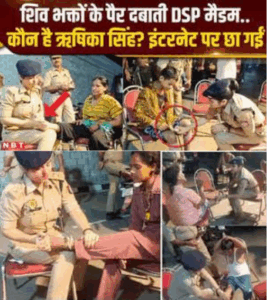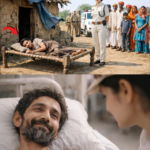Kanwar Yatra Viral News: CO Rishika Singh massaged the feet of Kanwariyas | Muzaffarnagar CO Viral
As the sacred month of Sawan unfolds, millions of Kanwar pilgrims across India embark on a physically taxing yet deeply spiritual journey, carrying holy water from the Ganges to offer to Lord Shiva. Among the many stories emerging from this massive religious movement, one that has touched the hearts of people nationwide is that of a woman in uniform — Circle Officer Rishika Singh of Muzaffarnagar, Uttar Pradesh. Amid the overwhelming crowds, challenging logistics, and high-stress security scenarios, this senior police officer has become a beacon of compassion and service. Her actions have not only humanized the image of law enforcement but also elevated the spirit of public duty to a higher moral ground.
In recent days, visuals of CO Rishika Singh personally applying ointment to the blistered feet of Kanwariyas, massaging tired limbs of elderly women and children, and assisting pilgrims in their moment of exhaustion have gone viral. These gestures, while humble, carry profound significance in a setting where the police force is often perceived solely as an authority figure maintaining control. Instead, Singh has shown what it means to serve the people in the truest sense—through care, humility, and empathy. Her dedication is all the more remarkable considering that she is simultaneously leading the complex coordination of the Kanwar Yatra’s law and order in Muzaffarnagar, a critical node in the pilgrimage route.
Speaking to local media, Rishika Singh emphasized that the Uttar Pradesh Police, under the guidance of senior officers and the district administration, is operating in a round-the-clock mode to ensure the safety and convenience of both the pilgrims and the city’s residents. The police presence is 24/7 on the ground, ensuring smooth traffic movement and resolving any disturbances along the pilgrimage path. The aim, as she articulated, is not just crowd control but a holistic commitment to public service. Whether it is the local commuters or the Shiva devotees walking hundreds of kilometers, the police have vowed to make their experience as trouble-free as possible.

But Singh has gone beyond standard duty. In addition to her logistical responsibilities, she has been actively involved in personally serving the devotees, especially women and children who often struggle the most in such mass gatherings. She highlighted the special focus given to female pilgrims this year, with separate sanitation facilities and toilets set up across the Kanwar route. She confirmed that the administration has deployed adequate medical assistance points, where first aid and basic treatment are provided to those suffering from fatigue, blisters, or minor injuries.
In many of these medical points, Singh herself has stepped in — not to inspect but to serve. Her gestures are not symbolic but active. Pilgrims have been seen tearfully thanking her as she applies ointment on their sore feet, listens to their stories, and gives them the moral support to continue their religious journey. This kind of hands-on leadership is rare and stands in stark contrast to the distant image often associated with senior officials. Her work has won accolades from citizens, devotees, and civil society alike.
When asked why she personally chose to engage in such service despite her high rank, Singh responded with the simplicity of a devotee. She stated that her faith in Lord Shiva is no less than the pilgrims she is assisting. Just as these devotees undertake long, difficult journeys out of devotion, she believes it is her spiritual and professional duty to ease their burden in whatever way possible. For Singh, policing is not just enforcement — it is seva, a service to the people and, through them, to God.
She further shared that with four more days of the Yatra remaining, her team is fully prepared to handle the growing number of pilgrims. According to her, this task does not feel like a challenge because the police have made extensive preparations for all contingencies. From route planning and crowd management to emergency response drills, every officer involved has been briefed and trained. Unexpected events may still arise, but Singh expressed confidence in her team’s ability to handle them effectively and without panic.

A major part of her responsibility also includes the safety of women, an aspect that requires constant vigilance. In recent years, incidents of harassment during mass gatherings have raised serious concerns across India. However, Singh proudly stated that no such incidents have been reported so far in Muzaffarnagar, thanks to intensive patrolling, strategic deployment of female officers, and public awareness efforts. Her team has conducted outreach programs in pilgrim camps and used social media to keep in touch with citizens. Announcements from loudspeakers and vehicles are used to inform and warn people, especially women, about the precautions they can take and the support systems in place.
More importantly, she made it clear that any anti-social elements attempting to disturb the safety or dignity of women would face immediate and severe legal consequences. She reiterated the administration’s zero-tolerance policy and warned that even minor infractions would be met with swift police action. This proactive approach has helped foster a sense of security among women devotees and reassured families who send their loved ones on the pilgrimage.
Under her supervision, the city has seen extensive infrastructure improvements tailored specifically for the Yatra. Temporary shelters, water points, food stalls, medical aid camps, and gender-segregated toilet facilities have been installed along key sections of the pilgrimage path. For elderly devotees and children, volunteers are available to provide additional assistance. Singh has also coordinated with NGOs and local organizations to ensure that these services run smoothly and reach the most vulnerable.
Despite the intense workload, Rishika Singh remains visibly calm and composed. Her demeanor on the ground reflects a blend of discipline and warmth that has inspired her colleagues and the public alike. When she sits beside an elderly woman to massage her feet or comforts a child crying from exhaustion, she does not wear the expression of an official performing a task, but of a guardian extending love and care. These moments, captured by news cameras and citizen videos, have turned her into a symbol of compassionate governance.

What makes her actions even more significant is the timing. India’s policing system is often criticized for being insensitive or heavy-handed, especially during large-scale public events. In this context, Singh’s approach offers a refreshing counter-narrative. It demonstrates how empathy can be integrated into public service without compromising authority. It shows that leadership is not about distance, but about presence—about standing not above the people, but among them.
As the Kanwar Yatra enters its final stretch, the challenge for the administration remains high. The number of pilgrims is expected to peak, increasing the pressure on traffic, medical services, and law enforcement. But if the past days are any indication, Muzaffarnagar is in safe and capable hands. With officers like Rishika Singh leading from the front, both in command and in care, the district has set a powerful example for the rest of the country.
Her service serves as a reminder that behind every uniform is a human being capable of great kindness and humility. That service to the nation often comes in the form of small, quiet actions that restore faith in institutions and inspire others to lead with heart. In the sacred month of Sawan, while lakhs of devotees offer water to Shiva in devotion, officers like Rishika Singh offer something equally divine — their time, energy, and compassion to make another’s journey a little easier.
If every officer approached their duty with such sincerity and love, public service would not just be a profession, but a prayer. And in the story of CO Rishika Singh, that prayer has already begun to echo far beyond the streets of Muzaffarnagar.
Play video :
News
Eskişehir, 1990 – Okula Giderken Kaybolan Kız – 22 Yıl Sonra Babası Eski Yıllığa Bakarken Fark Eder ki…
Eskişehir, 1990 – Okula Giderken Kaybolan Kız – 22 Yıl Sonra Babası Eski Yıllığa Bakarken Fark Eder ki… Bölüm 1:…
Kunuri’de Bir Destan: Türk Askerinin Efsanevi Direnişi
Kunuri’de Bir Destan: Türk Askerinin Efsanevi Direnişi Giriş – Uzak Bir Yolda Başlayan Hikaye 17 Eylül 1950 günü, Türkiye tarihinin…
ड्यूटी से लौट रहे लड़के ने करोड़पति लड़की की जान बचाई… आगे जो हुआ, किसी ने नहीं सोचा था…
ड्यूटी से लौट रहे लड़के ने करोड़पति लड़की की जान बचाई… आगे जो हुआ, किसी ने नहीं सोचा था… ….
जिसे गरीब नौकरानी समझा… उसी लड़के ने करोड़पति के बेटे के कान ठीक कर दिए 😱 | Story
जिसे गरीब नौकरानी समझा… उसी लड़के ने करोड़पति के बेटे के कान ठीक कर दिए 😱 | Story . ….
2 साल बाद बेटी आर्मी Officer बनकर लौटी तो, बूढ़ी माँ बस स्टैंड पर भीख मांग रही थी — फिर आगे जो हुआ..
2 साल बाद बेटी आर्मी Officer बनकर लौटी तो, बूढ़ी माँ बस स्टैंड पर भीख मांग रही थी — फिर…
20 साल पहले फौजी ने किराया पर दी थी पुरानी साइकिल, आज वही गरीब लड़का लग्जरी कार लेकर लौट आया!
20 साल पहले फौजी ने किराया पर दी थी पुरानी साइकिल, आज वही गरीब लड़का लग्जरी कार लेकर लौट आया!…
End of content
No more pages to load












